Britain’s Food Dependency During WWII
At the start of World War II, Britain was painfully dependent on food imports.
Over two-thirds of Britain’s cheese, sugar, cereal, and fats were imported. So were four-fifths of its fruits, half of its meat, as well as a third of its eggs.
During the Nazi Blockade the British had to rely less on meats, dairy products, eggs, fish, and butter, and instead turned to foods they could raise and harvest themselves. Foods such as wholemeal bread, margarine, potatoes, carrots, and other vegetables were the main staples. Salt was never rationed and ,as a result, was used quite liberally on foods to improve the taste.
One of the Nazi’s main strategies during the Battle of the Atlantic was to blockade the British imports and starve them out using submarines.
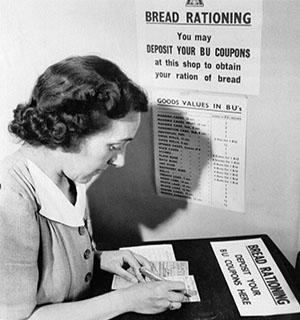 The British saw this coming and issued the first ration booklets in September of 1939.
The British saw this coming and issued the first ration booklets in September of 1939.
These booklets were not ‘free food coupons’ but instead just allowed the people to purchase the listed foods.
Unique ration books were given to those who requested them. Vegetarians could give up their meats in exchange for more vegetables. Jews and Muslims were allowed to trade meats for cheeses, and Jews were given access to kosher meats. People with diabetes were also taken into account, able to substitute meat, cheese, butter, and margarine for their sugar ration.
Related: 7 Survival Foods Made by Soldiers During WWI
Rationings
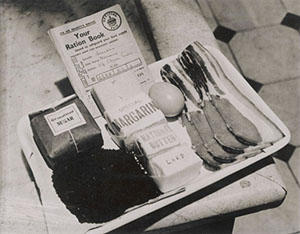
In September of 1939, the British first rationed out petrol. After that, the food rations began. In January 1940, bacon, sugar, and butter were rationed.
In the following months, foods that were heavily imported began to be rationed as well. This included meats, cheeses, biscuits, cereals, eggs, lard, milk, teas, jams, and fruit (both canned and dried). Fish were never rationed, but supplies were limited, and people would line up in massive queues outside fishmongers.
Fresh vegetables, fruits, and bread were never rationed but supplies were limited. Oranges were mostly reserved for pregnant women and children, and apples were usually limited to one per person by the farmers and shopkeepers.
Bananas and lemons were so scarce that people thought they no longer existed.
During this time, food prices rose about 20%, which was a remarkable improvement from World War I, when they had increased a whopping 130%.
Eventually, the coupons were accompanied by a points system for various foods. People were given a specific number of points, which was to last them four weeks. Different foods were worth varying amounts of points, based on supply levels. People were originally given 16 points each. That number then changed to 24 points, and then 20 points before the rationing finally ended.
Every week, a food’s points could change, and people would religiously check the newspapers to keep up with these changes.
Foods that were rationed using the points systems were tinned foods, such as meats, fish, and beans, as well as non-tinned items like biscuits, cereals, dried fruits, and legumes.
When the points rationing first began, a pound of canned salmon and a can of American sausage were worth 16 points each. No one was buying the canned American sausage, so it dropped to 8 points, while the salmon rose to 24 points. Eventually, the British gave this strange sausage and chance and came to like it.
This exotic meat was in fact Spam and it was sent over from America in abundant amounts.
Related: 11 Food Storage Lessons Learned from WWI
Dig For Victory
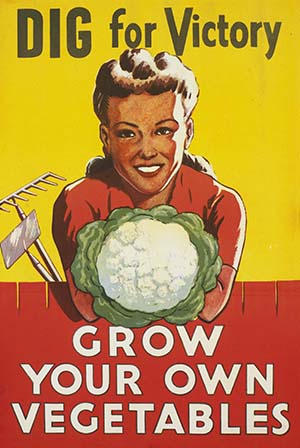 The “Dig for Victory” Campaign or “Victory Garden” Campaign was wildly successful, and significantly improved the lives (and meals) of citizens everywhere.
The “Dig for Victory” Campaign or “Victory Garden” Campaign was wildly successful, and significantly improved the lives (and meals) of citizens everywhere.
Victory gardens were gardens that people grew to rely less on the public food supply and more on themselves. This allowed the government to focus less on feeding the general population, and more on feeding those directly involved in the war efforts. The money that the civilians saved also contributed to the country’s war budget. Shipping space that was freed up by importing fewer foods was then dedicated to transporting war supplies.
Victory gardens were grown in backyards and public areas alike, meaning that even those in apartment buildings and townhouses could participate.
These gardens could be found almost anywhere that land wasn’t being used, such as waste grounds, road and railway edges, vacant lots, front lawns and rooftops. Even golf courses and sports fields were put to good use. Some of the sports fields that weren’t gardened were used for grazing sheep.
Royal Parks and monuments were not exempt from the “Digging for Victory” efforts either. Hyde Park in London was tilled up and gardened. The tennis courts from Sutton, London, were also transformed into community gardens. Onions were grown in the shadows of King Albert’s Monument, and both Buckingham Palace and Windsor Castle grew victory gardens.
People were also urged to raise rabbits and chickens in their backyards, though this campaign proved much less popular than the Victory Gardens.
Rabbits could be used for their meat and fur, while chickens provided meat and eggs. Both creatures produced waste that could be used as compost for the Victory Gardens.
The rabbit’s fur proved especially handy since clothing was rationed too. A new coat could use up an entire year’s worth of rationing points, so making your own was a smart solution.
During WWII, the British were limited to one egg per person – per week. Vegetarians and pregnant women were granted an additional egg. This limited amount of eggs forced people to raise their own hens. When people grew their chickens, they could trade their weekly egg allowance in for grains to feed the chickens. This was an excellent trade-off, since most hens produced 5-7 eggs each, every week.
When the War finally ended, the population was surprisingly healthier than it had ever been or ever has been since. The Wartime rations forced people to eat fewer fats and sugars, and more vegetables, grains, proteins, and vitamins. The poor and the wealthy ate the same way, thanks to the ration books. Infant mortality rates dropped, natural deaths rose (meaning that people were living longer), and children were taller, heavier, and healthier than before the war started.
In 1945, it was estimated that 75% of all foods consumed by the British, were grown or raised in Britain, making the “Dig for Victory” campaign a major success.
What Can We Learn from This as Modern Preppers?
Should we ever experience a shortage of food, it’s wise to be self-sufficient. We shouldn’t rely heavily on imports, or even grocery stores for what we need, as that can all cease. Means of self-sufficiency include:
#1. Raising gardens and small backyard animals, such as rabbits, chickens, and hogs. This can significantly improve your family’s health, happiness, and mealtimes. If you have a strong preference for what you eat, make an effort to raise or grow that food item. It may become scarce, expensive, rationed, or even non-existent one day.
#2. Stockpiling canned foods can be largely beneficial. Canned foods such as fruits, vegetables, meats, and fish are fantastic to keep around. It’s also nice to save herbs and spices so that we don’t become too dependent on flavor enhancements such as salt, pepper, fats, and butter.
#3. When food is limited, and we must eat homegrown, we become healthier. So perhaps instead of waiting for a disaster to to strike, we should already be adapting some of these survival methods into our lives today. For the most part, we are well equipped enough to raise our own foods but many people don’t, and choose to stay dependent out of convenience.
You may also like:
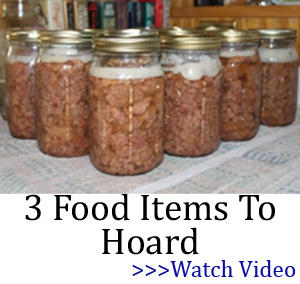 How Much Land Do You Need to Be Self-Sufficient?
How Much Land Do You Need to Be Self-Sufficient?
The Lost Book Of Remedies By Claude Davis (Video)
24 Lost Gardening Tips from 100 Years Ago
Where Free Land Can Be Found in the USA
Who Needs the Most Food in a Crisis? The elderly? The Young? The Women?








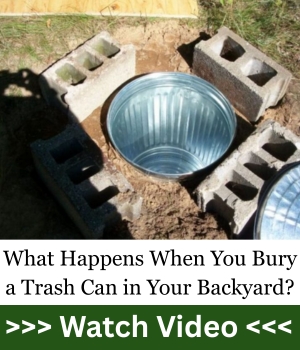






Better keep a garden going from early spring into the winter to get a variety of vegetables. Hard work and time.
and keep a “seed bank” from the vegetables you grow to make sure you can continue to grow your garden.
While it is just my opinion without any scientific basis whatsoever, although I am open to a government grant to do a study, I believe the longevity of the Greatest Generation, the Brits in England, the Japanese and everyone else who survived WWII is due to the healthy diet they ate as young people and the large amount of walking and bicycling they did during their formative years.
While the suburbs weren’t nearly as extensive as they are today, in most small towns, and I lived in a small town outside Philadelphia, had much larger lots for the homes than exist today. The tract I live in now, and the lot size is large compared to what is being built today except for McMansions, four homes are built on the lot that we had at our house in the small town along the main line between Philadelphia and Washington DC. We had a rather large Victory Garden which continued even after the war. We didn’t have chickens but we did have rabbits for a while.
Unfortunately with present city codes in the city where I live now and the lot size, I could probably sneak in a bunny or two but I doubt I could grow chickens as they are way noisier than rabbits. I would have to make sure I cleaned up the poo daily as even rabbits get to smell unless one is on it. I would probably have to use kitty litter or something under the hutch to mask the odor of the urine from Nosey Nellie neighbors. It would be nice to be able to maintain a breeding pair of each, but until the end of the world happens, I would constantly be skating on the edge of a citation from the building department who is now using google maps to look for code violations.
I wonder how long it will be before they start using drones to look for code violations. 1984 is really here.
I completely agree with you 1984 is here and stay alert stay prepped and stay as self sufficient as you can
Food you grow is your God-given right. I don’t care what country you are from. Stand up and take back what is rightfully yours. No man can tell you that you cannot make efforts to feed your own family. Get a damn goat if you want. Give them hell. We are in for the fight of our lives against those that are craving control over us at every turn and with every lever they can get their grubby hands on. G/L.
“the poor and the wealthy ate the same way”
That’s pretty delusional
I agree, David.
Everything I have read about the war in Britain is that the rich continued to dine on whatever they wanted as long as they were willing to pay the price. Much the same as here.
There were some rich who refused to buy on the black market as there were in this country. My parents didn’t smoke. They could have gotten cigarette coupons and traded them for meat coupons or shoe coupons or whatever else they wanted because cigarette coupons were in the biggest demand. They also didn’t drink and could have done the same with liquor coupons. They didn’t. They didn’t believe in assisting the drug dealers of the day, the black marketeers.
In theory the rich and poor alike got the same coupons and if you go on the British government line, the rich and poor were treated equally. As we all know, money talks and the rich were able to get what they wanted when they wanted. If they couldn’t find what they wanted it was always available at the private clubs that the rich belonged to.
At least that is what I have read. I wasn’t in England at the time. Too young for military service in WWII although some say that I look old enough to have served in WWI.
left coast chuck, you are funny. I was born 1946 but grew up on depression & war stories. When I was 3 my family moved to So. Cal. – it was a very different place then. Lots were big, everyone had gardens, we had fruit trees, grapes & chickens. And we weren’t rich! Hey, we might be old but we ain’t sissies! Lol
Yes, Linda, if you lived in the San Fernando Valley in the 50s and early 60s that was when California truly was the best state in the Union in which to live. I feel like a stranger in a foreign country these days. The town I live in is not noted for it strong leftist leaning like Berkeley or some others, but my philosophy is out of step with the biggest percentage of folks.
Left Coast Chuck – if you would publish your first book about Outdoor Skills or Survivalism – “I will be the first to buy it or order it online from Amazon…”
Well, thanks for the high praise. It is appreciated.
Pleasure’s all mine left coast chuck! I will always keep posted till that awesome book arrives; BTW – I so enjoy reading the book (in my Deep Forest Off-the-Grid Mega-shelter) of Claude Davis – The Lost Ways Book 1. I still don’t have Book 2 & The Lost Book of Remedies, but I’ll surely be eyeing for them in the nearest future.
Rationing in Great Britain didn’t end until 1954. It ended in the U.S. in 1946 according to various articles I have read.
I liked the part about raising a hog. My wife tells me her father raised a pig in their back yard in Yokohama, Japan right after the war. He went out into the country to a farmer he knew in the village where he grew up and bought a piglet and raised it. With all the people struggling to survive in Japan after the war I don’t know how he managed to keep it.
Considering the hissy fits the code enforcement gestapo throw when someone is raising a couple of chickens, a pig in my backyard would most likely involve a swat raid complete with vertical envelopment from the sheriff’s helicopter.
Get a pot-bellied pig and call it your “comfort animal” and say you need it to calm your nerves! Kidding aside, zoning in metro and suburban areas is crazy, and from what I’ve read a lot of communities will even try to restrict what you can grow in your backyard, nevermind your front yard. That’s why we should all familiarize ourselves with edible plants that are more uncommon to the average nosey Parker. Jerusalem artichoke is just one example. Subversive gardening! 😉
We have hoa’s here in the valley limiting kinds of trees & how many. I’m in the “country” with carefully unnosy neighbors. Yeah, I’m concerned how to build without the eye in the sky seeing it.
My Grandfather was the town dentist in the little town of Marfa,TX for many years, including the depression years. As LCF says, most people walked or rode horses and nobody got fat. One cool thing is that up into the 60’s life there followed the Mexican schedule, go to work in the morning, eat the main meal at noon and have a nap, then back to work til 5 or so. I think this is a much healthier schedule for us, but a lot less efficient for the bosses.
My Mom said during the bad years of the depression he was often paid with chickens, eggs, milk, prepared foods, even yard work. The barter economy seems to spring up easily whenever it is needed.
The 19 min. Video for “The Lost Ways ll”
Its an infomercial for the book with a hook to pull you in. Promising to tell you about Super Foods that are self sustainable for long periods without refrigeration.
Yet not once did the narrator ever mention a name of anything; let alone recipe.
Bait and switch tactic for sales agenda only. I didn’t gleem a single valuable tip from the 19 min. Presentation. Sounds like a good book if the promised info is included.
i have book 1 and it was very good reading. diagrams for how to. recipes ect.
I want book 2. problem is I want a book, not an e book. actually had to buy a color printer for the e books.. Need to look, may aready have the medicine book.
I’m done with this website. Goodbye!
Hi Wannabe. What happened?
Sorry to worry you Claude, I was not being serious. I should have been more descriptive. How in the world can anyone call spam sausage? Lol
I agree – calling SPAM a “strange sausage” did me in also …
Spam is strange especially to someone who has never seen it before. I’d be leery of it too if I didn’t know what it was. After all, it had just been introduced in the US in 1937, two years before the start of WWII. That war is what made Spam popular and widely known. Good timing on their part.
Actually, it isn’t that far off. Sausage basically is ground up meat. If you kill game and have it butchered, the butcher will make sausage out of the scraps of meat. You can ask him to put it into skins and get links such as you see in the grocery store. You can ask him to make patties, but he charges for the work that he does. Making sausage patties is not rocket science, so why pay union butcher’s wages to make patties out of sausage when you can easily do it yourself? If you don’t ask the butcher for links you get your sausage wrapped up in convenient bulk pack and you make your own sausage patties. Spam is basically ham sausage stuffed into a can. If you don’t know the actual name of something you tend to call it by what you know, hence the Brits called it sausage because it most closely resembled that other meat by-product we shipped overseas during WWII, Vienna Sausage.
We all have our own individual tastes. For me, I much prefer Spam to Vienna Sausage. There are readers of this list who prefer Vienna Sausage. That’s why there is variety on the grocery shelves.
I guess spam would not be too bad if it wasn’t so salty. Maybe that is the preserve factor in its recipe for a long shelf life. Many months stored in a warehouse then loaded on a boat then gets to other side of world then unloaded and delivered to particular areas then distributed among people. I have tried frying it, eating with sandwiches, masking the flavor with hotsauce(which did not work at all because it only enhanced the salt). I would eat it if I was starving but I am not stock piling it that’s for sure
Hormel is making a low salt version of Spam now. You are right, it is salty. It may be that in an EOTW situation where we can’t run down to the corner grocery and pick up a box of Morton’s or La Fleur Imported Fench Sea Salt, salty food will provide the sodium chloride that our bodies do need. In an EOTW scenario, I suspect that high blood pressure will be low on the list of crises we are addressing on a daily basis. Our first priority will be just plain old getting enough to eat period. With our significantly reduced waistlines, we will not be subject to the diet induced maladies we presently suffer from. When folks go from a size 48 waist to a size 28 waist I suspect that if they had the means to check their BP it would be well within normal limits as would their formerly high glucose levels.
It may be in an EOTW you will find yourself devouring any Spam you run across not just from hunger, but our bodies have a tendency to seek out foods that they need to function and if you have a sodium deficiency, Spam may just taste like the most wonderful meal you ever had. Being really, really hungry helps make food taste fantastic too.
Well put
Hoping to survive on what you can raise can be a lot harder than one might think.
This year, our garden has failed and we really don’t know why. The plants look healthy but are producing nothing. The few tomatoes that have appeared will not ripen. They hang on the vine until the rot, never turning red. They won’t even ripen sitting in a sunny window. Japanese beetles are devouring the apple trees no matter what we do. The blueberry bushes have only tiny berries. The Chinese jujubes are about the size of small grapes and already turning brown. They should about the size of a walnut and still green. They shouldn’t turn brown, their ripened color, for another month, at least.
I’ve learned from a friend in Colorado that people all over the country seem to be having the same troubles. A neighborhood forum I belong to says the same thing. Are any of you having similar problems this year?
It takes warmth, consistent warmth (70-80) for tomatoes to ripen, so maybe it has been inconsistently cool in your area of the country. I believe that abnormally hot temps will do the same thing. In NC we have experienced very wet cool spring with a hot dry summer. The wet really hurt the early crops and the seed in some cases literally rotted in the ground. We planted corn 3 times with no success–ended up buying corn from a farm who raises it to sell. Tomatoes are very late this year for us due to the cool temps early on, but they do seem to be ripening although at a much slower pace than normal.
Dandon, I’m in NC too, just south of Lenoir. Looks like it’s just a bad growing season for us. Last year, we had all kinds of vegetables, this year zilch. At this point, I guess all we can do is hope for a better year next year.
Located a little east of Lenoir, ours is not serious because we have the means to water, but it is awfully hot and dry!
Dandon, same problem with my area of Texas. Had very wet spring which delayed planting for a month. Even after planting when I thought it was safe , still took three weeks for seeds to fully germinate and produce healthy plants. Now it is so stinking hot plants are not getting fruit like they should. If I could have planted at beginning of March like normal instead of beginning of April all would be well. A lot of hard work for little result. Very disappointing. Oh well can’t control the weather.
Have you been using a lot of fertilizer?Some times too much Nitrogen will make all the energy go to the leaves and the plant doesn’t fruit well.
No, we do not use chemical fertilizers, other than the special ones for our fruit trees. We use composted kitchen and yard waste, and composted manure when we can get it. My son also adds rock dust when needed. He is really the gardener in the family and prefers organic methods. He’s even given up on the garden this year when he usually works it until frost.
Good move Homesteader, always best to use natural fertilizer that is why it is good to have chickens if you can. Every time you clean out the cage take the manure and put in compost pile. I use wood shavings from tractor supply to line the floor and it makes cleaning so much easier. Scoop up in wheel barrel dump in compost pile and spread new shavings on floor. Cleanup complete. About an hours worth of work.
I don’t have any chickens yet but a neighbor does along with a few goats. When they decide to clean out their shelters, we occasionally get some it. Mostly, we’re able to get some free composted horse manure from a boarding stable not too far from us. They even load it for us. All we have to do is haul it away.
Homesteader, absolutely! My bell peppers get a little bigger than a golf ball then start to rot. No squash had done well. Potatoes are dying back while barely blooming, potatoes will only maybe make seed potates next year. I’m in SW Idaho & everyone is telling me the same thing. Monsanto’s Revenge?
Monsanto’s Revenge is as good a guess as any. Maybe next year will be better. We can only hope.
Linda, how is the bee population where you live?
I hear the same from everyone I know who tries to grow a garden. Makes me wonder if something is being done to the seed so they will not produce. We have a lot of enemies who would like to see this country fail.
I am only raising green onions this year and they are doing fine. I had a minor problem with aphis but washed them off with soapy water and they haven’t come back. Didn’t try anything else. Having a lot of other problems not related to crops keeps me too busy to do more.
“Wartime Farm” A good documentary about life in Britain during WWII is viewable on youtube. My garden had a poor return on the corn and peas. It was a longer cool spring here so a few things will come on later than the past few summer’s. Last year was hot enough that even fruit trees, berries and mushroom season didn’t bear well at all. This year is better so far, but there are those exceptions
Wartime Farm is one of the better ones of the whole “BBC Farm” series …..
https://www.youtube.com/watch?v=CUsU5s0ofYo&t=12s
Watch a BBC series on youtube called Wartime farm. Great living history series . There are others on there as well.
The BBC and PBS between them have turned out some excellent living history shows. I watch all of them I can find – Frontier House, 1900 House, the lot. They’re full of information on how our ancestors used to do things. Maybe more importantly, they show modern people finding some of the problems with the old ways and being taught how to get it right. They’re “infotainment” (I hate that word) but, for preppers, pretty good value.
Poor year here for tree fruits. Late spring freezes. Squash not looking too good. Most of the garden not great this year. Lettuce didn’t sprout till it warmed then it was quickly too hot. Tomatoes here, except tiny ones, do poorly. Outdoor season too short. Pretty good in a greenhouse but I don’t have one here at the new place just yet. Even tiny tomatoes bloom, but not setting this year.
Kale, jalapenos, mint, stevia, basil, and Japanese eggplant are about all that has done ok in the garden. My Thompson seedless grapes are doing the best I have ever seen them do. Thick with heavy bunches this year. Even wild tree fruits didn’t set this spring. The choke cherries have only failed to set a crop twice in the past 40 years of living in this general area… This is one of those years.
Petunias looming ok but marigolds not even very good this summer. Oriental lilies all bloomed beautifully. Squash blooming just fine…just not setting. Not even zucchini. Odd year indeed.
Making the most of the few things that are doing well. Eating fresh and drying the rest… Mostly green leaves like kale, mint, stevia, and lots of basil. Basil dried, preserved in olive oil and making pesto. My orchids in the kitchen are reblooming and doing well. I’d trade them for a prolific garden this year.
Just realize rasing a hog takes alot of feed even if there on pasture, I still have my Chickens and Goats. I might go back to rabits but ill never breed Hogs again. Might raise one for meat.
Salt, store salt its great for food, preserving and getting the rabbit hyde dried out.
Been stringing beans all evening, work is never done 😉
We’ve been trying to raise a little of our own food here in the Denver area. Smallish, sloped yard, but starting to get lots of zucchini, tomatoes, and cukes thanks to our “earthtainers” my husband constructed from online directions as well as new raised metal garden beds. The raised metal beds are deep, so to save money on organic soil from the big box stores, I researched and came up with “hugelkultur” from Germany…. filling the bottoms with pieces of tree trunks, branches,herbicide-free grass clippings, leaves, etc….basically biomass. Then you just need a few inches of soil as a top layer. As the biomass decays, it slowly releases nutrients, and also the rotting tree logs act like a sponge to hold water. A healthy, edible “weed” called purslane came up in the raised beds, and I let it be. I found online recipes for it and we enjoyed our first tomato/cucumber/purslane salad with fresh herbs, lemon juice and olive oil last night! Same with lamb’s quarters, another nutritious edible “weed” that popped up in our garden…I use it in my green smoothies! I cut down to the first leaves, and it grows back like cut-and-come-again lettuce!
For our raised beds I almost threw in straw from bales the neighbor left on the curb trash day, but read that most is treated with persistent broadleaf pesticides…meaning it doesn’t break down for possibly years. Even composted manure from livestock that eats the straw is supposed to be tainted.
Despite the next door neighbor keeping bees the last 3 years, I think I see less than when we moved in 11 years ago. I plan on planting a lot of bee-friendly flowers next year.
A friend in the next town over helped change her city’s ordinances so that chickens are now allowed there.
Our HOA allows folks to keep up to 4 chickens as long as neighbors don’t complain. I was pleasantly surprised to learn several suburban areas around here allow a handful of chickens. You won’t know unless you ask!
I have watched a great series on YouTube, The Wartime Farm. It discusses what country families did, what the government did, and how they coped with less labor. There are 9 videos, about an hour each, fun and fascinating.
PL C I watched the first part last night. Excellent recommendation, thank you.
another re-run article, but valid. Learn and prepare as best you can before a crisis, which will make you better prepared to handle the situation.